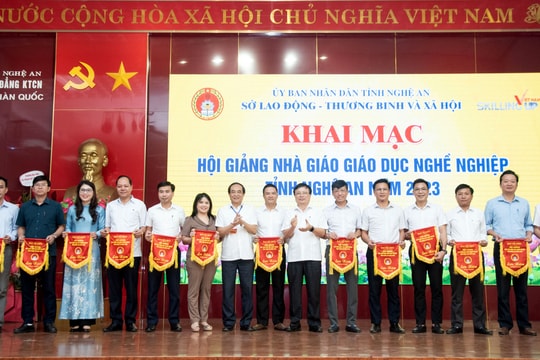Sharing of typical vocational teachers in Nghe An
(Baonghean.vn) - To become a good vocational teacher, one must not only have good teaching skills and be solid in expertise, but also constantly update technical innovations and master practical skills like real workers. That is what some vocational teachers we met shared.
Production experience to master practical skills
One day in mid-November, we had the opportunity to attend a class by Mr. Dang Khac Hung (born 1973) - a teacher of the Faculty of Industrial Electricity, Vietnam - Korea Industrial Technical College.
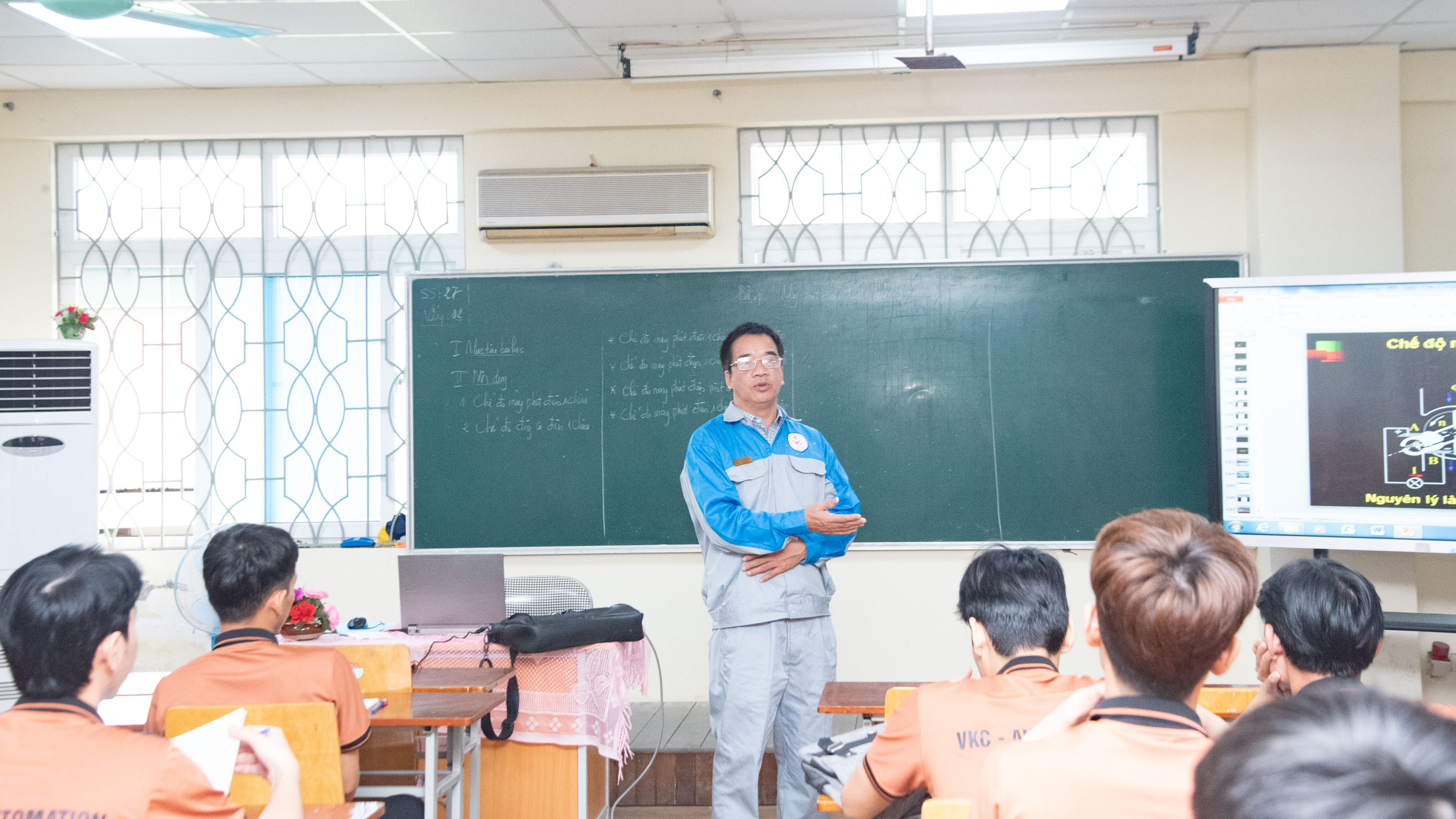
The lesson took place in a class of about 30 students, in a spacious classroom, with familiar teaching equipment such as blackboard, chalk, laptop, projector, and presentation board. The only difference was that around the rows of desks were many models and practice equipment, such as electrical instrument practice sets, machine wiring models, transmission line experimental models, single-phase and three-phase motor control models, etc.
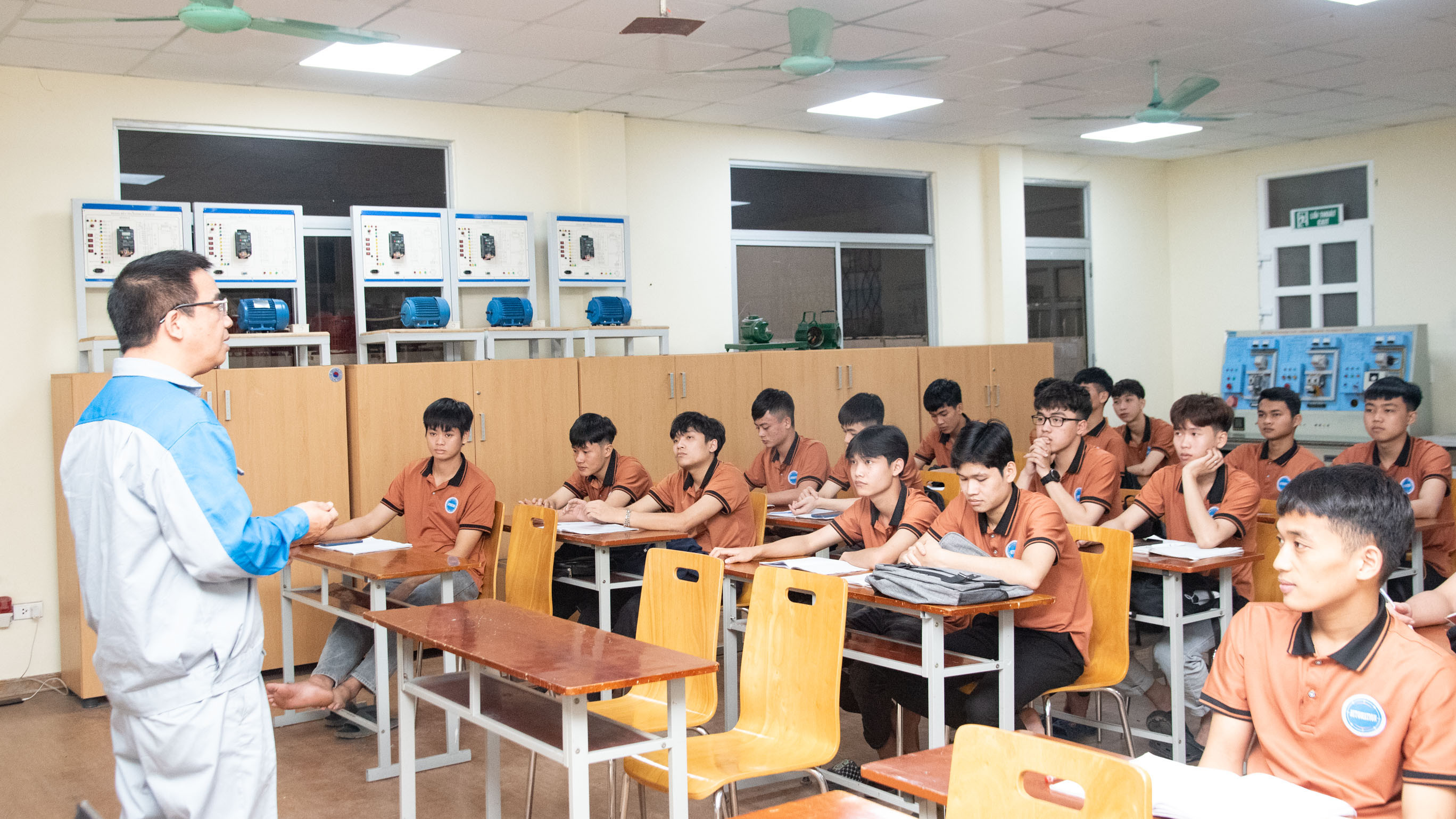
After more than 15 minutes of theory, the lesson became more exciting when Mr. Hung guided students to practice on models.
“The characteristic of vocational training is 70% practical teaching, 30% theory teaching. If in the past, vocational teachers taught theory in a separate classroom, and practice in a separate classroom, in the past 5 years, integrated teaching in vocational training has been increasingly focused on; students both learn theory and start practicing right away. Therefore, teachers must have specific skills in teaching vocational practice in the workshop environment and in production and business enterprises, and have an industrial style,” Mr. Hung shared.
Born into a farming family in the suburban commune of Hung Hoa (Vinh city), graduating from high school in 1991, due to difficult family circumstances, Mr. Dang Khac Hung did not choose to go to university but instead learned to drive construction machinery, then worked in this profession at a company in Khanh Hoa province.
However, the dream of becoming a university student in an engineering field always burned, so in 1998, after saving some money, he decided to return to his hometown to study for the university entrance exam. In 1999, he passed the entrance exam to Vinh Technical Pedagogical College (now Vinh Technical Pedagogical University), majoring in Industrial Electricity.
After graduating in 2002, he learned that the Vietnam - Korea Industrial Technical College was recruiting teachers. He applied and passed the exam, becoming a teacher at the school since then.
With over 20 years of dedication to vocational training, with diligence, eagerness to learn and dedication to the career of cultivating people, Mr. Dang Khac Hung has become one of the outstanding teachers of the Vietnam - Korea Industrial Technical College. He has won many high prizes in provincial vocational education teacher conferences, provincial and national self-made training equipment competitions.
Most recently, in October, at the 2023 Vocational Education Teachers' Conference, Mr. Hung won First Prize with his lecture "Construction of a 3-phase asynchronous motor winding diagram using a single-layer co-molded type".
Industrial electricity is an industry that plays an extremely essential role in today's life from business, production to daily life. Meanwhile, electrical equipment is increasingly improved to be more modern, more sophisticated, with special emphasis on automation. Therefore, to meet the requirements of the task, an Industrial Electricity teacher must always be conscious of learning to improve qualifications and must have practical production experience. In addition, it is necessary to participate in research, development activities, innovation of training programs, innovation of teaching methods; regularly participate in building models and teaching aids to serve teaching and learning well...
Accompany and stick with students
Leaving Mr. Dang Khac Hung's class, we continued to watch Mr. Le Hong Minh's class - a teacher of the Faculty of Automotive Technology. Different from the classroom where Mr. Hung taught before, the classroom where Mr. Minh's class took place was arranged in reverse, with a car engine model system in the middle, surrounded by rows of tables and chairs. In this class, Mr. Minh guided students to find car engine errors using diagnostic equipment.
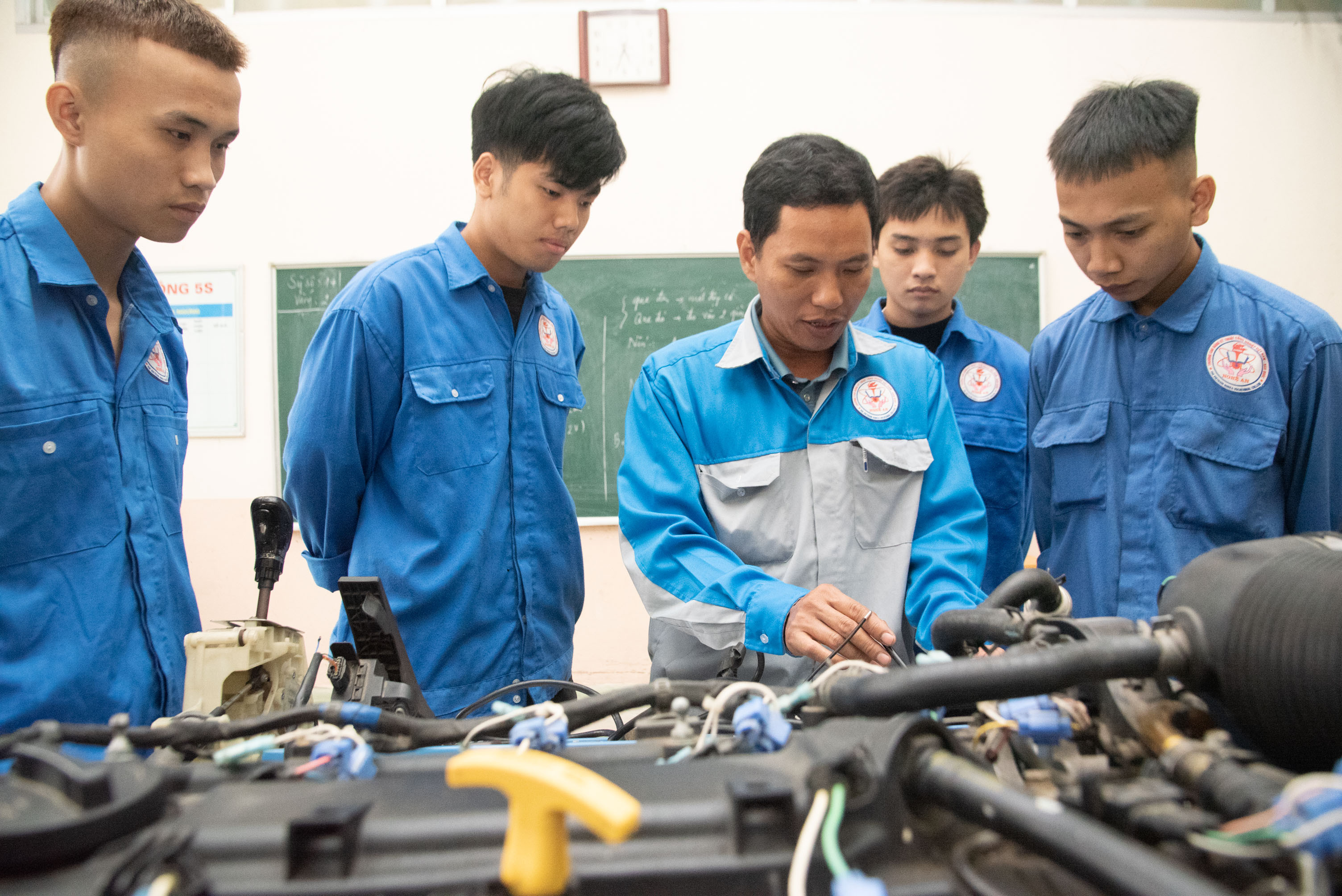
“In the field of automotive technology, there are many car manufacturers, with many different types of cars, every year releasing new models with complex control systems, the emergence and increasing popularity of electric cars. Therefore, to train technicians capable of operating and repairing these modern cars, teachers must first research, learn to master the technology and participate in actual repairs. From there, they will have the knowledge and skills to convey to students,” Mr. Minh shared while instructing students.
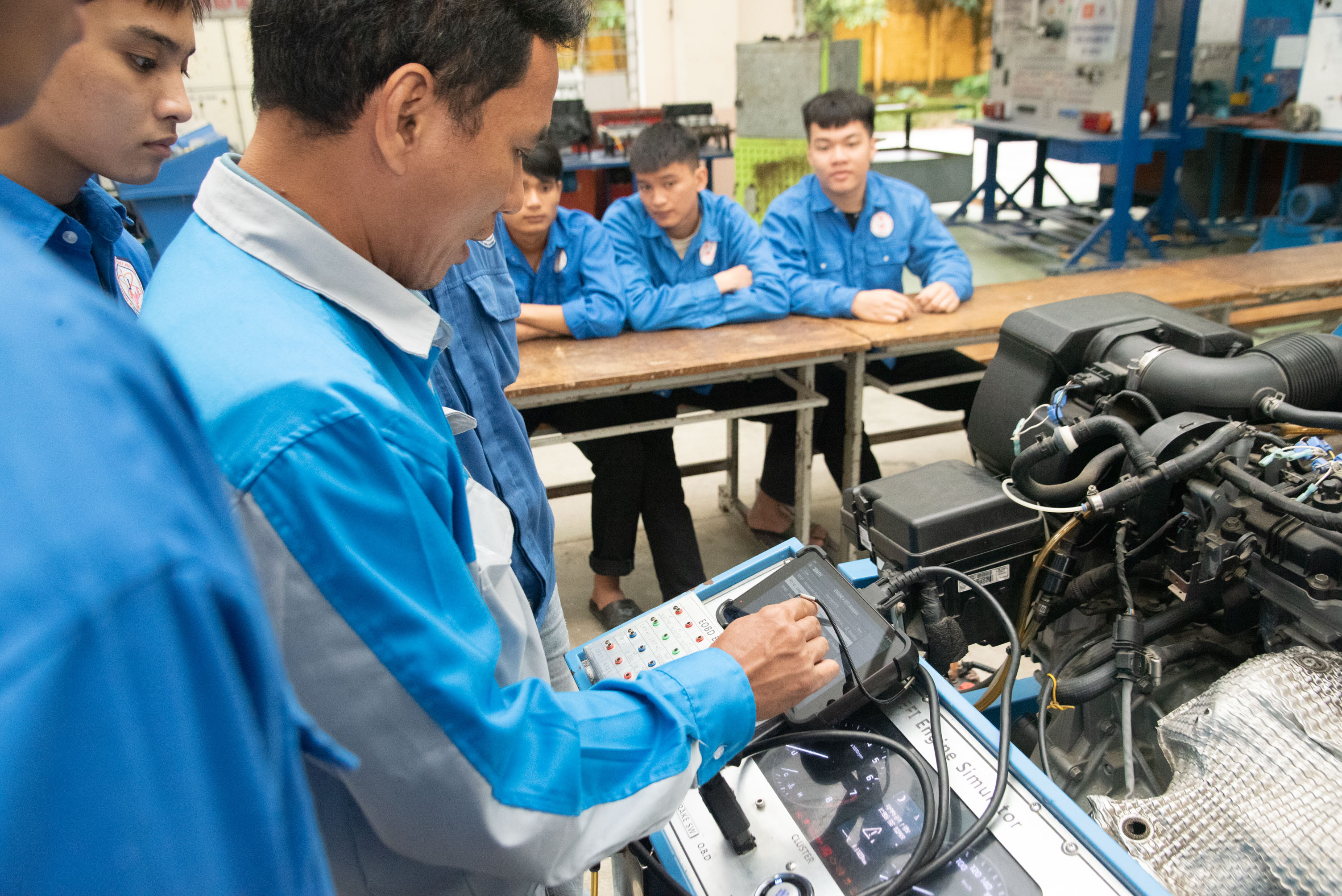
Born in 1981, in Yen Khanh district, Ninh Binh province, a special opportunity brought Mr. Le Hong Minh to the career of teaching in Nghe An. In 2005, after graduating from the Faculty of Mechanical Engineering, Hanoi University of Science and Technology, majoring in Internal Combustion Engines, Le Hong Minh coincidentally met Mr. Nguyen Duy Nam - then Principal of Vietnam - Korea Industrial Technical College when he was on a business trip to Hanoi.
“After chatting, the teacher asked me, “Do you want to go to Nghe An to be a teacher?”. I asked the teacher to let me visit the school and found that this was a suitable environment for me to work long-term. So I decided to stick with the school from then on. After that, I fell in love with a female staff member of the Primary School, who was from Nam Dan district and considered Nghe An as her second hometown,” Mr. Minh confided.
With nearly 20 years of working at the Vietnam - Korea Industrial Technical College, in addition to his teaching ability, Mr. Le Hong Minh is also one of the teachers specializing in guiding students to participate in provincial and national vocational skills competitions. He received a Certificate of Merit from the People's Committee of Nghe An province for guiding students to win prizes in the provincial and national vocational skills competitions in 2017 and 2020.
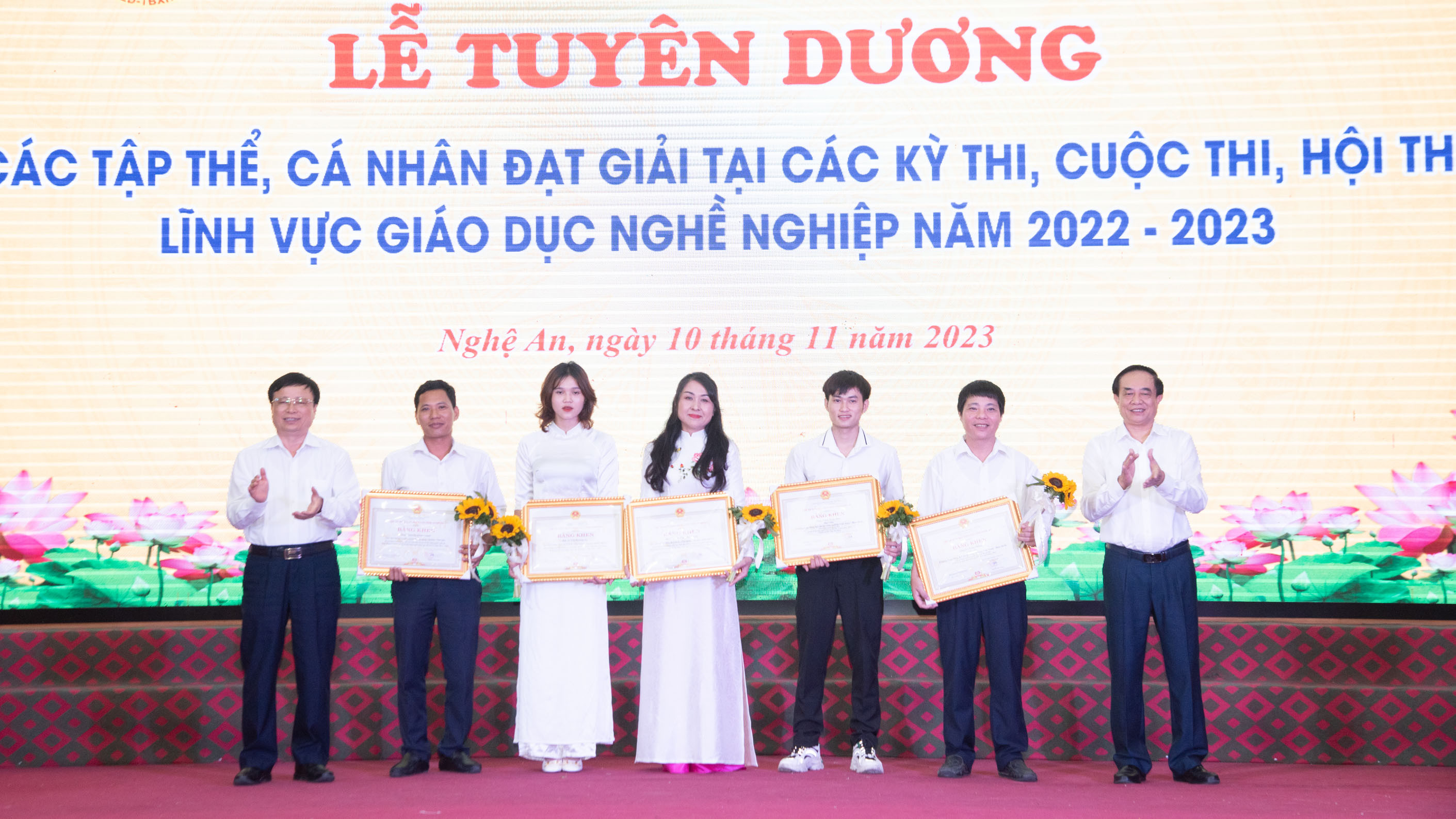
Most recently, in September 2023, Mr. Minh was awarded a Certificate of Merit by the Provincial People's Committee for his achievements in guiding student Nguyen Van Duy to win First Prize at the Nghe An Provincial Vocational Skills Competition in 2023.
But according to Mr. Minh, in his teaching career, the most profound memories for him are the times he took students on internships.
“One of such memories was the time I took students on a production internship in Bac Ninh province in 2009, in a joint venture company with high labor discipline requirements. The number of students participating was quite large, while the company did not have a dormitory, so the students had to stay in rented rooms outside the company 2-3 km away, and had to walk to work. At first, the students were not used to the working time and environment, so some of them were late and absent from work. Faced with that reality, although I was arranged to stay in the company, I stayed outside to accompany and encourage them to practice diligently and comply with the company's regulations. Therefore, the internship was a great success and was highly appreciated by the company," said Mr. Minh.
According to the assessment of the Board of Directors of the Vietnam - Korea Industrial Technical College, Mr. Dang Khac Hung and Mr. Le Hong Minh are the outstanding vocational teachers of the school for many years. The two teachers received many Certificates of Merit and Merit from all levels and sectors. However, the meaningful gift for Mr. Hung and Mr. Minh is "seeing their students have stable jobs and succeed in their vocational training" and especially "vocational training is increasingly viewed more positively and becomes popular in social life".
According to the report of the Department of Labor - Invalids and Social Affairs, as of June 30, 2023, the total number of vocational teachers in the province is 2,260 people (of which, 783 are on the payroll, 1,477 are on contract), working at 52 vocational training institutions (including: 9 colleges, 12 secondary schools, 22 vocational education centers, vocational education centers - continuing education, 10 other institutions participating in vocational training).



